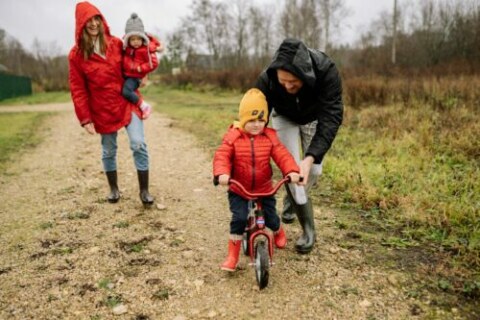Let’s face it. As much as we may strive to have that picture-perfect holiday season where everything goes according to plan and the children are well behaved, the truth is that this time of year can be a stressful time for families. Like a couple’s first trip to Ikea, the holiday season can serve as a monumental stress test for the entire family with all the shopping, cooking, traveling, and hosting in conjunction with the kids being home from school. So below are a number of tips to help you have a handle on child behavior during the holiday season.
Maintain structure and routines as much as possible: Children and adults alike all benefit from having structure in their daily lives. Morning, nighttime, and school/work routines allow us to predict what tasks/activities come next. This predictability and consistency help us to minimize feelings of stress and anxiety and appropriately manage our own and our children’s behavior. The holidays, however, is often a time when ongoing schedules get thrown out the window. Such shifts in the routine can result in increased stress and enhanced irritability in ourselves and our kiddos, leaving us all more susceptible to slip-ups in our behavior. In order to best have a handle on holiday stress, it is important to maintain your family’s routines as best you can.
- When children are out of school, maintain morning and evening routines and structure their day as much as possible, reviewing the day’s plan with them in the morning.
- Provide warnings when transitioning to a different activity, especially when off-routine.
- If you are one of our Parent Child Interaction Therapy (PCIT) families, keep consistent with daily Special Time and closely follow scripts for consequences!
- If you have a child with anxiety, continue to live an exposure lifestyle, practicing their bravery throughout the holiday season.
Plan ahead and catch your child being good: When planning on being out of the house, remember that children can’t be expected to run errands for several hours without some challenging behavior. With the above described changes in routine, one could anticipate from children more whining, more demanding, or having more outbursts than usual. To set you and your child up for success, make a plan before leaving the house.
- Think ahead about the kinds of behaviors you want to see from your child.
- Tell your child where you are going and how you want them to act: “We are going to the grocery store. I want you to stay beside me in the store and use an indoor voice.”
- You can help your child be successful by planning activities that keep them occupied during outings, such as crossing items off a grocery list, playing I Spy, or allowing them to help place things in the shopping cart.
- If you anticipate your child being bored, it’s useful to bring a small bag of toys to keep them occupied when they must be quiet or still, like a doctor’s office.
- During the outing, keep an eye out for appropriate behavior and catch them being good with praise: “Thank you for using your indoor voice; You are walking so calmly beside me; I am very proud of you for sitting patiently while we wait.”
- Be aware of your child’s limits. If you see your child is getting tired, hungry, or bored, take a break or go home. And avoid taking your kiddo out past their bedtime or during times they typically nap.
- Plan a small portion of your trip that will be fun for your child. If shopping, for example, walk through a store/section your child enjoys. This will give them something to look forward to and help incentivize appropriate behavior.
- At the end of the outing, give lots of praise for appropriate behavior and no attention to problem behaviors that may have happened: “You stayed right by my side while out in the store. It was so fun to shop with you!”
Self-care. Self-care. Self-care: Kids aren’t the only ones more prone to outbursts during the holiday season. Adults are just as susceptible to being more reactive and quicker to anger to stressors around this time of year. This could be you or the adults surrounding you as you wait in line at the register, squeeze onto a crowded subway train, or are stuck in a traffic jam during rush hour. And remember that children learn about the world and how people interact by observing and imitating their parents’ behavior. So this is as good a time as any to practice and model your own self-care to stay cool, calm, and collected in the most trying holiday hassles.
- While we may do our best to maintain routines and plan for outings to set you and your child up for success, it is inevitable that some challenges will be thrown your way. Anticipate them! Whether that be a cranky child or a cranky stranger, prepare how you will respond to them or escape from the situation quickly.
- Be aware of your own limits during outings. If you find yourself running out of steam or patience, take a snack break or head home.
- Plan time for yourself! This might be stopping for a treat after running errands, meeting up with friends without the kids, or taking a long hot shower or bath. The holiday season is for everyone, so be sure you dedicate time for yourself.
- When unable to immediately escape any stressors, use coping skills as needed, which may include
- taking three slow, deep breaths
- tensing and releasing tight muscles in your body to relax
- momentarily stepping away for a glass of water and a moment alone
References
Eyberg, S. M. & Funderburk, B. (2011). Parent-Child Interaction Therapy protocol. Gainesville, FL: PCIT International.
Gurwitch, R. H. (2019). Have a holly-jolly Christmas, play spin the dreidel, enjoy the foods of Kwanza, or bah-humbug all around (unpublished handout). PCIT International, Durham, North Carolina.









